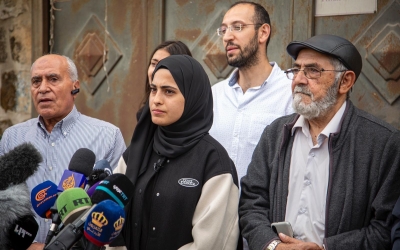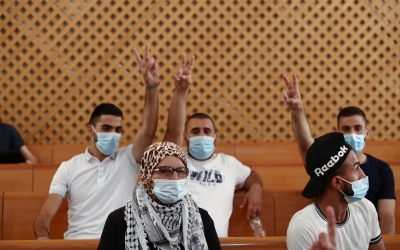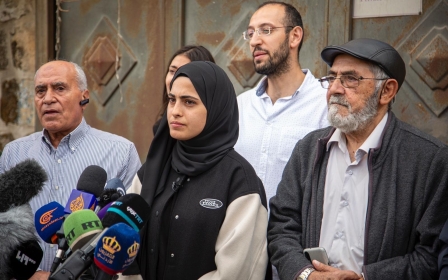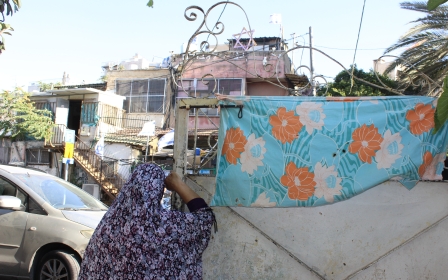Sheikh Jarrah: Can a new 'popular solidarity' save the neighbourhood from evictions?

Palestinian families facing expulsion from their homes in the occupied East Jerusalem neighbourhood of Sheikh Jarrah are currently considering their next step after they rejected an Israeli court's proposal that would eventually lead to their eviction in favour of Jewish settlers.
Saleh Diab, a resident of Sheikh Jarrah who is threatened with eviction, told Middle East Eye that the Palestinian refusal of the compromise offered by the court is an appropriate decision as the settlers themselves also refused it.
New MEE newsletter: Jerusalem Dispatch
Sign up to get the latest insights and analysis on Israel-Palestine, alongside Turkey Unpacked and other MEE newsletters
The settlers are seeking a definitive ruling by the court, ordering immediate eviction of the Palestinian residents and acknowledging the settlers' right of ownership to property in the neighbourhood.
Diab described the ruling proposed by the highest judicial authority in Israel as "a trap". He says, however, that the residents should feel comfortable because the rest of the Palestinian people are standing in solidarity with them.
"The Palestinian resistance also pledged its readiness to wage a new war in case the Israeli occupation proceeds with its crime of evacuating the neighbourhood," Diab said.
Although Diab does not believe that any of the families will be evicted soon, he predicts that the restriction and harassment of the residents will increase following their refusal of the compromise.
In fact, he said, the harassment had already begun with the decision by the Municipality of Jerusalem to build a nursery school for Jewish children. This is in addition to a plethora of arbitrary decisions to confiscate property and to hand eviction orders to residents in the western part of the neighbourhood.
The case is getting more complicated by the day as the Israeli settlers continue to claim ownership of an 18 dunum property that hosts 500 Palestinian refugees who were given housing units in the Karm al-Jaouni neighbourhood by the Jordanian government and the UN Agency for Palestinian Refugees (UNRWA).
On 2 November, the residents declared their refusal of a compromise proposed by Israel's Supreme Court which would enable them to stay in their homes as protected tenants under the Nahalat Shimon Jewish settler company in a prelude to expropriating their property by degrees.
The Palestinians accuse the court of evading the responsibility of reaching a final ruling, yet coercing them to choose between eviction from their homes or succumbing to a malicious deal.
Palestinians see this as an extension of the colonial policies that aim to disrupt the social solidarity they have achieved since May during the latest popular protest movement.
They also consider such recourse as an attempt to conceal what they say amounts to "ethnic cleansing" committed by Israel and its settlers.
The Palestinian residents hold the Israeli government accountable for the expropriation of their homes, but they also extend the same responsibility to the Palestinian Authority (PA), the UNRWA, and Jordan who built the Sheikh Jarrah housing units as residential homes in 1956 and granted the residents ownership rights to the property.
'Undisputed ownership'
The plight of the families has become an issue that has attracted attention across the world and been a rallying cry for Palestinians in the occupied West Bank, besieged Gaza Strip, Jerusalem, Israel, and beyond.
In May, the possible evictions triggered protests in Palestinian towns and cities in Israel and contributed to a flare-up in violence in Gaza, where Israel waged a deadly bombing campaign.
Israeli forces killed at least 260 Palestinians, including 66 children. Twelve people were killed in Israel by Palestinian rockets, including two children.
'We will not go back on our decision because we have evidence from Turkey, Jordan, and the UNRWA confirming our undisputed ownership of the property,'
- Hashem Sallymeh, a resident of Sheikh Jarrah
Hashem Sallymeh, also a resident of Sheikh Jarrah, told MEE that rejecting the court's deal was the right decision.
"We are heading towards the unknown, but we strongly believe in the justice of our cause," he said.
"We will not go back on our decision because we have evidence from Turkey, Jordan, and the UNRWA confirming our undisputed ownership of the property. However, the settlers resorted to malice and forgery and the Israeli courts stood by them."
Sallymeh is not hopeful about the justice or fairness of any ruling by the Israel Supreme Court in the future.
"How could a court sitting on stolen land [the court lies on the land of the displaced village of Lifta] rule in fairness or even be described as a Supreme Court? We don’t trust the Judicial System of the occupation," he said.
Sallymeh argues that Israel will continue to pursue all means to forcibly evict and dispossess the residents of Sheikh Jarrah in favour of settler-colonial projects that serve its biblical narrative in Jerusalem.
Four legal options
Khaled Zabarka, a Jerusalem attorney told MEE that there are four legal routes available before the Supreme Court within the few coming days after the Palestinian residents of Sheikh Jarrah announced their refusal of the deal proposed by the same court.
The first option is to schedule a new court session to hear the defence from both parties. The second is to propose a new modified deal. The third is to request a summary of the previous pleas.
The fourth option is the issuance of a ruling based on the legal pleas available before the court from the appeal request folder that was lodged by the Sheikh Jarrah families against the two eviction rulings issued by the Magistrate and Central courts respectively.
Zabaraka maintains that the space available before the Israeli Supreme Court is quite limited when it comes to the acceptance of the appeal lodged by Palestinian residents and cancellation of eviction orders as it could contradict previous rulings by other courts.
Zabaraka added that the court considerations are not purely legal. Rather, it also has to consider how the Jews would react if it issues a ruling in favour of the Arabs.
The court is also cautious about the consequences of turning down the appeal and granting property ownership rights to the settlers within the wider regional and international context.
As a result, the supreme judicial authority in Israel found itself in a difficult situation. It hoped that both parties would accept the proposed deal and it could avoid a politically controversial situation, according to Zabaraka.
Ziyad Ibhais, a Jerusalem affairs researcher, said that Israel was hoping that the Palestinian residents of Sheikh Jarrah would accept the court's proposal, so that "the Sheikh Jarrah case would be removed from the central issues in the conflict for several years to come".
The collective refusal by the Palestinians came as a surprise for Israel. "It deprived the occupation of an opportunity to announce a total victory in case the residents accepted the deal," says Ibhais.
Israel pre-empted the court ruling by expropriating the property of both the Odeh and Obeidat families on the eastern side of the neighbourhood just two days before the end of the ultimatum, as well as the issuance of eviction orders to residents on the western side of the area only one day after the end of the deal.
Based on this collective stance by the Palestinians, Ibhais is expecting "a retaliatory and vindictive escalation" by Israel.
He believes it is high time to renew the popular solidarity around the people of Sheik Jarrah.
"It is of vital importance to recognise that the Karm al-Jaouni issue - as well as the issues of the other neighbourhoods facing the peril of displacement - is not only a case of property to be defended by the owners and their lawyers," says Ibhais. "But rather it is a political, existential issue."
Middle East Eye delivers independent and unrivalled coverage and analysis of the Middle East, North Africa and beyond. To learn more about republishing this content and the associated fees, please fill out this form. More about MEE can be found here.






